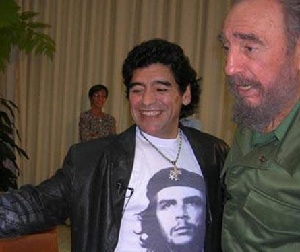No one carried the ball closer to his feet, as if by hand; no one was so transparent and, at the same time, so sensitive, on the field and off; no one ran, in barely ten seconds, almost 60 meters with the ball “tied” to his cleats, to let it fly for a goal that shook the world, in 1986.
On the world’s soccer fields, where he was recognized for his ability, but rejected for his ideas, no one was as misunderstood. His rebelliousness, and later his drug addictions were the pretexts used by the suits to censure him. The real reason was his sharp criticism of the powerful, speaking out against the injustices that players and fans experienced.
Those who were never going to understand him, did not care to do so. They would have been obliged to first pass by kilometer zero of this man, in Villa Fiorito, a forgotten point in the geography of his country, in the Buenos Aires metropolitan area. “There was no water, no bread, no meat there,” he said more than once. As a boy in those pastures, he dreamed of playing on the national team. He came from the bowels of Argentine neoliberalism, the same system that delivered the blows he suffered in life, and against which he armed himself with ideas.
Like all mortals, Diego Armando Maradona is gone. Of course, he was a genius of soccer, the sport of the multitudes, not because of the money of the rich, but because, since antiquity, individual physical skill has been exalted. The masses need only a coconut as a ball to play. The same thing happened in medieval times. There were only a few knights, but the many, the commoners would launch a fratricidal battle over this round object.
Maradona is mourned by these masses. The fields, the stadiums seem to cry, even the goalkeepers he defeated with his magic. But those who feel the loss most deeply are the Latin American peoples who he never betrayed; the humble who traveled on his powerful left leg, author of his works, the same leg that waded through the mud in Fiorito and carried the people, led them, to make headlines. The people he always greeted with an “Onward to victory!”
 He turned his commitment to the integrationist causes of Latin America and the Caribbean into beautiful goals. Never before were the masses so well represented, nor did anyone defend the Argentine flag as he did.
He turned his commitment to the integrationist causes of Latin America and the Caribbean into beautiful goals. Never before were the masses so well represented, nor did anyone defend the Argentine flag as he did.
Cuba hurts and hurts deep, because he loved our country as his own, and history rewarded him by uniting him with the man he considered his second father. “I lived in Cuba for four years and Fidel would call me at two in the morning. We would have a mojito to talk about politics, or sports, or whatever was happening in the world, and I was always ready to talk. That is the most beautiful memory I have. If there was an event, he always called to see if I wanted to go, if I wanted to collaborate, and that is not easily forgotten,” he said, upon learning of Fidel’s departure, on another November 25.
“When clinics in Argentina closed their doors to me, Fidel opened his heart to me in Cuba. The number one revolutionary was Che, with Fidel at the head; I came along in the rear platoon. I came to be with my second father; the greatest still here. I am a Cuban soldier; I am here for whatever Cuba needs. They gave me love when I was sick. I get up every morning and I can talk, and I owe that to Fidel, who honored me by giving me his Comandante en jefe’s jacket, putting it on me.”
Maradona crowned his ideas, alongside journalist Victor Hugo Morales, with another great goal on the teleSur network program “De zurda.” On January 16, 2015, in a legendary exchange with the Comandante en Jefe, Diego stated: “Fidel, if there is one thing I have learned from you, over the years of a genuine, beautiful friendship, it is that loyalty is priceless, that a friend is worth more than all the gold in the world, and that ideas are not negotiable. That’s why De Zurda is a tribute to our friendship.”
He was a militant of the left, of feeling and of action. In 2017, when Venezuela was again attacked by U.S. imperialism, in an attempt to destabilize the Chavista government, Maradona declared himself a soldier of the Bolivarian Revolution, keeping his word, his promise to Comandante Hugo Chávez.
“A soccer legend has left us much sadness, a brother and unconditional friend of Venezuela. Dear, irreverent Pelusa, you will always be in my heart and in my thoughts. I don’t have the words to express what I feel at this moment. So long, Pibe de America,” tweeted Venezuelan President Nicolas Maduro. From Bolivia, Evo Morales commented: “With pain in my soul, I learned of the death of my brother Diego Armando Maradona. A person who felt and fought for the humble, the best soccer player in the world.”
Maradona is the man we remember with his tattooed body affirming his principles. On one shoulder, an image of Che and, on his invincible left leg that scored so many goals and showed his love for the fans: Fidel.
The golden kid, el Pibe de Oro, became a legend as number 10, idolized around the world, but also, as Dios, in the hopes of those who, like him, aspire to score goals for humanity.
(Taken from Granma)